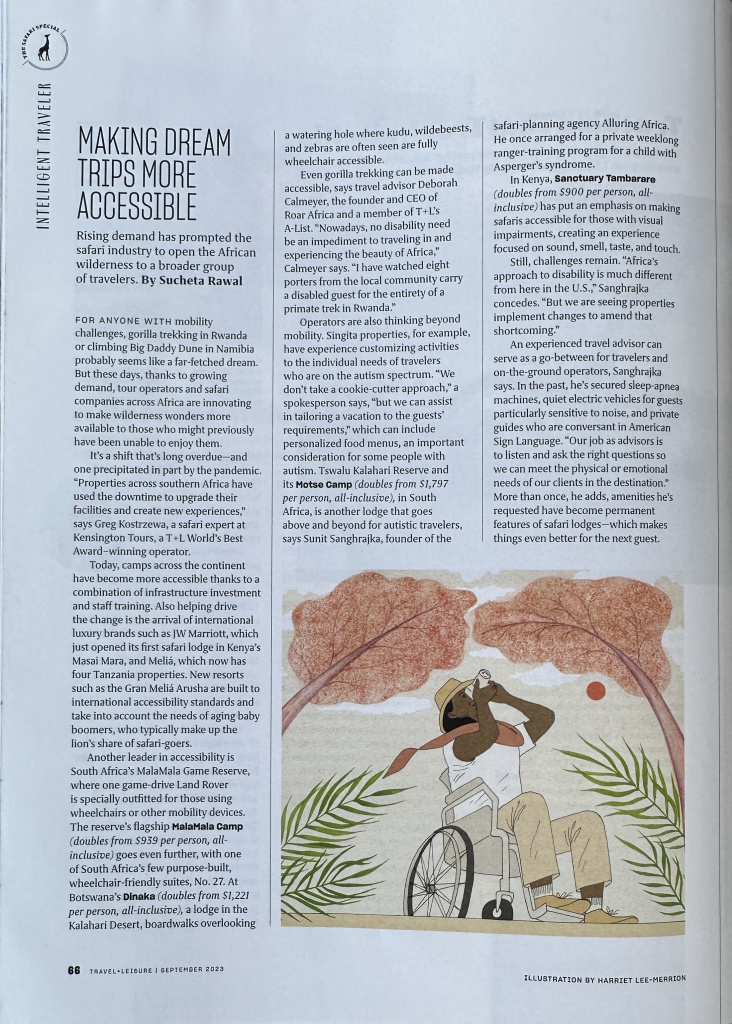Travel+Leisure. September 2023 print.

For anyone with mobility challenges, gorilla trekking in Rwanda or climbing Big Daddy Dune in Namibia probably seems like a far-fetched dream. But these days, thanks to growing demand, tour operators and safari companies across Africa are innovating to make wilderness wonders more available to those who might previously have been unable to enjoy them.
It’s a shift that’s long overdue — and one precipitated in part by the pandemic. “Properties across southern Africa have used the downtime to upgrade their facilities and create new experiences,” says Greg Kostrzewa, a safari expert at Kensington Tours, a T+L World’s Best Award–winning operator.
Today, camps across the continent have become more accessible thanks to a combination of infrastructure investment and staff training. Also helping drive the change is the arrival of international luxury brands such as JW Marriott, which just opened its first safari lodge in Kenya’s Masai Mara, and Meliá, which now has four Tanzania properties. New resorts such as the Gran Meliá Arusha are built to international accessibility standards and take into account the needs of aging baby boomers, who typically make up the lion’s share of safari-goers.
Another leader in accessibility is South Africa’s MalaMala Game Reserve, where one game-drive Land Rover is specially outfitted for those using wheelchairs or other mobility devices. The reserve’s flagship MalaMala Campgoes even further, with one of South Africa’s few purpose-built, wheelchair-friendly suites, No. 27. At Botswana’s Dinaka, a lodge in the Kalahari Desert, boardwalks overlooking a watering hole where kudu, wildebeests, and zebras are often seen are fully wheelchair accessible.
Even gorilla trekking can be made accessible, says travel advisor Deborah Calmeyer, the founder and CEO of Roar Africa and a member of T+L’s A-List. “Nowadays, no disability need be an impediment to traveling in and experiencing the beauty of Africa,” Calmeyer says. “I have watched eight porters from the local community carry a disabled guest for the entirety of a primate trek in Rwanda.”
Operators are also thinking beyond mobility. Singita properties, for example, have experience customizing activities to the individual needs of travelers who are on the autism spectrum. “We don’t take a cookie-cutter approach,” a spokesperson says, “but we can assist in tailoring a vacation to the guests’ requirements,” which can include personalized food menus, an important consideration for some people with autism. Tswalu Kalahari Reserve and its Motse Camp, in South Africa, is another lodge that goes above and beyond for autistic travelers, says Sunit Sanghrajka, founder of the safari-planning agency Alluring Africa. He once arranged for a private weeklong ranger-training program for a child with Asperger’s syndrome.
In Kenya, Sanctuary Tambarare has put an emphasis on making safaris accessible for those with visual impairments, creating an experience focused on sound, smell, taste, and touch.
Still, challenges remain. “Africa’s approach to disability is much different from here in the U.S.,” Sanghrajka concedes. “But we are seeing properties implement changes to amend that shortcoming.”
An experienced travel advisor can serve as a go-between for travelers and on-the-ground operators, Sanghrajka says. In the past, he’s secured sleep-apnea machines, quiet electric vehicles for guests particularly sensitive to noise, and private guides who are conversant in American Sign Language. “Our job as advisors is to listen and ask the right questions so we can meet the physical or emotional needs of our clients in the destination.” More than once, he adds, amenities he’s requested have become permanent features of safari lodges — which makes things even better for the next guest.
A version of this story first appeared in the September 2023 issue of Travel + Leisure under the headline “Making Dream Trips More Accessible.”